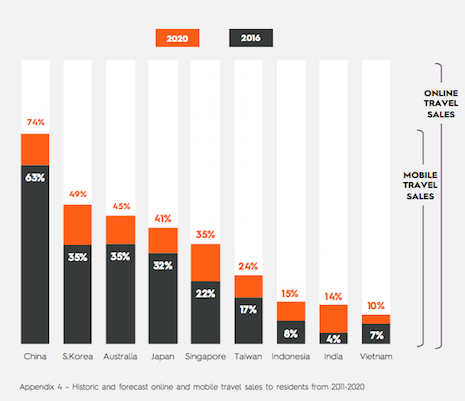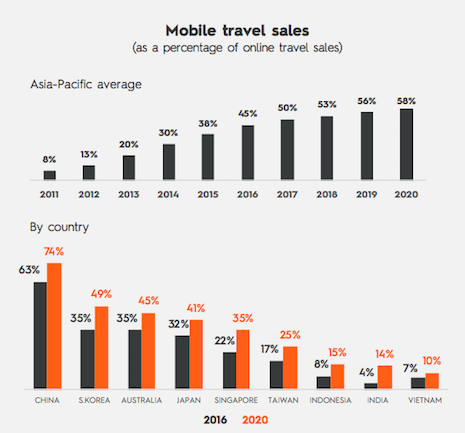As the millennial generation comes into the age when luxury travel becomes a major pastime, mobile is emerging as a key way of reaching these consumers and allowing them to easily book their trips.
In a new report from Criteo on millennial travelers in the Asia-Pacific region, 37 percent of respondents said that they use travel apps to book and manage their trips abroad. The number of millennials taking luxury trips is growing and companies need to be aware of how they are managing those trips if they want to make the most of this surge.
"The future of the travel industry is full of opportunities," said Yvonne Chang, executive managing director of APAC at Criteo, New York. "At Criteo, we anticipate technologies to continue to evolve and impact the travel business.
"In our vision for the future, we believe that travel players will be able to identify travelers consistently regardless of the device they use, and deliver a superior customer experience at every stage of the travel process, among many other innovations that will transform in the industry."
Millennial travelers
For young travelers in Asia, mobile is increasingly the most prevalent way of staying connected.
Criteo estimates that by 2020, three out of four households in China, and two out of three in Vietnam, will be equipped with smartphones, making the countries more connected and susceptible to campaigns involving mobile activation.
In terms of travel, related sales through mobile have surpassed 50 percent in Asia this year. By 2020, this will extend to almost three quarters of all online travel bookings.
Criteo expects that mobile travel sales will grow by 60 percent between 2017 and 2020, citing the same amount of growth in mobile travel sales in South Korea in the period from 2011 to 2017.

Mobile travel sales. Image credit: Criteo
Millennials, defined here as consumers born from the mid 1980s to the late 1990s, are a dominant force in the travel industry and the largest generation currently living with 2.5 billion members. These millennials overwhelmingly choose mobile as their channel of choice when booking trips.
In Asia, the majority of trips taken by millennials are domestic, but more international trips are being planned as well.
These trips are primarily influenced through social media, another inroad for brands to inspire millennial travelers to book with them.
Luxury trips
The United States is becoming a highly coveted travel destination among affluent Chinese consumers, and due to their spending habits the demographic has proven extremely influential, according to a new report from YouGov.
Chinese affluent look to purchase luxury goods while traveling abroad, and Chinese consumers spend the most out of any group while traveling. YouGov's Affluent Perspective 2017: Chinese Luxury Shoppers in America finds that 56 percent of Chinese affluent are planning a trip to the U.S. within the next two years (see story).
Many travel brands are transforming and catering their offerings to appeal to these valuable travelers.

Mobile travel sales. Image credit: Criteo
For example, private aviator VistaJet is expanding its China market coverage with a new Chinese language Web site in support of its recent compatibility with WeChat.
The aviation company is working to capture more of the lucrative business from Chinese luxury travelers as they criss-cross the globe with the launch of its new Chinese site. The move comes a few months after VistaJet unveiled the ability for Chinese customers to book a private jet through WeChat (see story).
"The developed and developing worlds are converging in terms of consumers’ online behavior," Criteo's Ms. Chang said. "In the developed markets, consumers are still more used to browsing for travel products on mobile devices, followed by booking on desktops and laptops.
"In the developing economies, it is much more common to use mobile devices for all stages of travel planning and booking, due to the ubiquitous presence of smartphones," she said. "However, the differences are closing.
"Consumer habits in the developed economies are shifting with increasing adoption of mobile devices at all stages, while the developing economies are catching up in infrastructure developments, such as higher penetration of laptops and desktops and greater security for online payments."
{"ct":"X6VhAIhEXLhPUNN5KaKITwyuC5PlZ2yDo\/KG27TWnC2RN1n0+PlPETD9\/eUKyVKqFjjKHJu8vYrvZG66AEYeFweDCzOmDd7RKhdWWu9yOHRHWGIetFFlAUDCFF4ZR6g\/l8OngS+hNjO7rQ2OH9BdWBpZS0BA8IMY7EYISuJuq4kWgSl8LBHRaC5tlDG7fMgWy+Tq70OCEBrhrcMC2OW\/coMKghFHCOOsD\/oKQBs4EI1wzAKfH3kqAwSSH3lSW4fmlc6hPqXFls9fUFNMS\/aypYIX6P7IsTx6iGlu0JGdTo+RnarNEtRiD\/ptuWi3f4ke9quNvo7qTUCuQT5biM\/0+etzc6mdN+DT9ZlLLX2y8Bsq\/uA75cyz6au9ScPde1CsvCFyrB52+rOfX5R8PLvpQB3W0XvCIfoiJlhxjaPKWAiPRlikP\/+TcFBbZZk+rmUdqFnT4g5xnelQqmHkv8gEiS1wk\/U1uzKKz\/LZx96BtN7KIK95pVW1CIBI5pkF9Ki734zlWu1CSgYVKrOTodTR5sTRPg+t2X+XPe49L0nWnHYk70pv+qDwhBteBbgwqBBNfqivfJwnw4X8QdjhgWrMBSmNk+9QcRXvMWnNstHebvJ6LoBnFggOVYxd3+N3FN3Iuz6xHxrQFFgzyzQRqGcfCqC+RCK47tkqleNxVjUTdj4I1M3CkKRblw4hBNvgsq9Zpa3fRL32FIIV\/wixtxUq46E\/JyV7GKcMzgVSDRzoXKLHXfO00WtcKgI\/C9bRY8OrqcgftjO5fV44wkx9GMm8u0KA0nLCho6y16r\/IBoIWBbtXqJCJvq3vQg7rG\/Iqh4aUdoujVXeiIUvnh7urU8qq4InfI8B\/XL60UlyeFhw+ZwxCHkHPrexE9Omyv72z3LqeZ5HwXooH4aCcPtb+PTNpswjbwjnY1PGAUPmqqPdbjzZvSM4fkw7mwcaddA38Tcec8nkCPyB\/s7hdfi3XDk7dnmIxwPAb\/yNgecnMOINANZZgLpqdjjIvsptnMQ7sfEVT1tnBzMmatCBZACcwgpgJv1+\/pElCVyiylZ3AS0O\/ryf+gZjrmahDaGqnC7Jglf8YQGbnfiHONucdMZx\/2Ap1cfcMt1uSZin5wzJeMkKX1OXK5So2acBdXVKuFEpHFEz0DLWk2dAzbizKgCSP2n50qLwm4SB43UMsVgKbClGQ3ycjyJzj81WkFKz6cCjdfV63YjzCA15nVCV\/0HUYfzBHAuqflkPmCzR6x+6U4ToIQaGwghpc8OSpVoG+Nci4VBQ0GE1UvLXp+z4+VrYkE9BcBwJx43t5PlzbM+n3fV1Yr5rbmy9uywkc+nZfGZLDXsWIuL0jxr6MRzbDh1VFUckjTDxSFskDhoOBXLQVlbqZTYYQsaWE18K1kMHfjN3PmgrgfuynMMdEyntTjWfC\/b0ViSmZlyz31hXqsxjDIzwzJPWjbrAGVMR7CoMo5fH+xQ+dOLmzHo9Ni3igf\/HRX6IkR3AxmUEogkVTm6YMdsgH3YL4iwleHPJfOVzVmq5SaXX\/2eOqoSNEGemv9TIX5Q9S+GIW6NOIGs8vn\/rScsWSATwifrHiAMo2hD2yM3HM43br03pk\/9B5n8MgHxp2RnSPol8LYsZLNvU2tdXPv5wrVq9BDmujgbGcUUyccNHGRTPxrk5cYveP7vc20wseimxR3ac5VQJN7djSMrxkTxUb\/gKrnfhyM1C3GZmuI5rIHXyZVlSVQeUGLsbUnQ1tQc2nfz830lJ19CIJYi9P4xDSceTQZxHNP1sqW+4GaMdaesTcVYIaZsBSPenzJ\/S7wQjVI759leVt6PEYb9tUVA7I2Xllf+cX6zx6jjIdZIaLhb7V+VBRLbolggJxNmnHmt04WPrDnb9pEk1zz\/7i4BX\/PtQyzCQi3zaq9CF\/0a0+iKFAgd+XI2JbotXNPV76MCPmGnRcqG+Omtj0xwqcbFl1nElP12yr\/IdStdxJwcV1FiJHLF0HPWMuxa0USylZs89TpfyZzxibnAlRr49AsagwTPDvaoVCAOlhpDUN6QkRQnP3hukRAX3d3s53NFwva8OOIbkbJWe5k55PpX+YFtDnsJSfSCyoMjztWykGLhFdNvqwez3Zc1q7D1Gz7CAQXThzXhck4fGYxZ+UoUeY\/itqYvHNP5IJSkbVE\/UThOIXcaptd0+udEZMERtzXB+RC3zbixam8g836wnqZmjinW\/5bsFVmCrotnTlLGoOE1kxXKRocN5KGCkAsSCputveHolCA13wLKyXj0uxwHfiRMeoqxhVOPBEhFJ2nPjWgmvcgBiSB9Dg1tKhoR1kECzisuHDKgGcMW8puDIU1ahUuML3BAL53PzahgSn2HTNu7iMbsHCffJuK28bEmk5IltpNxPpJQiA9fo0Eb30RAR4NrUZ2ZYuC+JusjaANh5AB8kwBWE13Q1sNh\/SCa0ir5GKUy3yhrsujpXNah0qcKwfBaBbDSrsjFH2HBrFDbrXm7r1QIWbLxNLfz6Gka73mtCplNIUOHmKeEUBxZ2aAOHlfpPWZWYueLtaMeos4RZbwyy+TVvGv+2g5wCcCz\/HKckX1cOpEV7jXXZF6RRJ+gm6kFne4AeMKRPvVPXbN\/7rZigTk85t2QwosqvkUKyuLQwtM+0Q4GgT6KpFGBVu1XZgRgXWVL5ObSoh8vVjnOxxWy1EVjPWD6rqCTKeRUqksyOlJO+8BcZavoAqIsOIW6hcoZXAUaTPykVXPkGGWDhWp5xX\/QCO712I8S+jO\/V9jqzLDbeBMLEyF8izdkWslpDECANFjtvU81hxRH6xPtDuj+RZYZXtEIxkJ9R0cUyzSbKTBxw+C0r5UD92sfQddrYjolmMVjeslJuN2Wghwt5RjT2jy8MNfZfBnOikz2GJoUa5jMbN6gv7msqqQeXbFB8ISofVPQS3V\/cKIXmMS7n3NZlg53otQ4WGKWZYy5Vy\/FTLms\/r5IL7OtgjzNsVJgtxx+SiFB7l4P74VPAgSHzSaSqXnqOcijqlYfKr+t\/GNNI2eyZVsnLQ8rH5tpYScSEe+QGW9sPU7NpgngmNSEoBehOlxMSudXmzQIgwFC7zAEEkmf7Jcptf+QLZZbCrKXdNUEaV5jVd7KmaUwa78HZUCYfVCJdoyqUdsasNlP1DGoJvaW4BKF96hfs2ymeeDw5UHKbxBwcxy3qeBfwTcQcAhHoo\/RNqivNUf0g947daCMj4rNEhY0VJDab6n4TglD+QAJpnYRZV4dZdB9iYBY5hKOCM0PAnODH\/7bZamtnYxY6AR21eHWSEyV2aZAwZrI5NaGDtHQWZldX\/q\/gqG3VoQLaiqxa6jNA1zhDF7lRyggWgmAMJdRGkJ7bP98n554dc+CAkImezsf0AZ6kSsjnShxSkO99wmBpaEZ9A4GLsIm1tfP+D\/vDchKyTsoF0x7oBOSF6012VMaIUyJW2SePzS+0vU8RlMPaeHZ2XWbRTwube2AULa5Jg1I0sryx\/PVK2yPN2\/h3y1yLNuQXUCYwt6WO682UnzAfDHIsdhnOa2m2800IbamCdwsUtM6vce6DvZmmISMNv47X1iSvuS\/SP+VDQKtY1RyPJ6b7kHmbLB44+ypa1b772pw8U7t8qT3ZgUHAWJH0GXR5UTd\/oe1sFGnIrFDpFyXi+p0lC0B2ucbnQj794r+\/hMCVCEHk1WIg2olf8Akv2sXJfueKYZtcCt\/nOkFZn\/HRWeNRCqIWOyvwhI0iUnq2Fv\/AmAPMtTBEFzfWd5+SP4hS9OAq\/ueqayGfMdm6yuOD6VqrtNSV5gIh1hktsf7vzvJMCg+A9ZLW1a1uzqAsBG4zVS2hPNt7gPEKQx968Lv6tAeWQSVgBPwU70xwIXgvg0pkuB1YvTqi3vtRDEGI52ZjiAFPseT584BWvXGOjFUgwKkgHYah\/PaEaPCNmyO8mXdkAUywhP5gLr4J5\/QvrH0MvkXxyhq2oOaoZO8wgxoVhzHpgXsrIHMvJWe5xUnixLxquEF\/ZxHnkNhFR9\/XyZzensN0y1GScqafwPP0W0Ktc26zCln4RfMfHY1l3SwJAejut3kqlDB\/NP7Lh+nF4OPxqGiZ+2lqdnoZSuG9exMzn+aSUOzt4cWwQjtf9zn85pZnUdN6R70HcfcLkyF9CQlM5iPEqNQaLcGpitL9zMotoBs7Vn2hH9eBFatCEbGM4jALBZ2YdxPB1D39q1d+qMAywHXnBtYsQfbjIiv+Xy\/0+0jeUNqeOurqe7NSvbzy6UIEvGUV+53VvYgnh0rWeqlMLA5YQ5+ydVwiW7JBXBNzh+yDV2\/Uh0kQ7rF2kw6vUCvds5iuIKh\/gDawT8s5qF7PsyVIJCif+PWLxFaeYnzw3Pu\/tOzOgpd6LpFDga3XDIk\/aFusUtKn9M4L9cf0hE\/JuCCnBjs2tb39p\/5nCI7iBPt7yLoRneppHMtaSNFkvTP7GfG7J1bxjyGRbPmzfnWmSeZLKYw85O5Ce58JET9F3bVUfU8guj1xw87hgNKfRDC0I0xZ8blcMs3ECscJZLCoUYDXQSt5Y+4sUC8rJoHKfyOEOuwznVE3YD2zBzPcjkMjD5mXhzPHemn98Hl3pKg6thcNuvT8+KHeWRp7XjIK2VsZsJxCOAdnXo2LzYG4iWDMEv97+yVkQYDbHr2a5DoOcDsT7FUeh3CF4KqwbSpDIGpDO1k7oQYGg57e9VD0ywFnTuNnAGHHHb3tbK3w64wci6lKpGbRpJlD5ieIrRnc+fjaacWEOkzjdH3dtpGWLiMmx4vIIgceSrPp8i+P1l+vtd1D\/oBuDNrogr7uq6CGp3yUwJjm40UqiIn3COEdQZpMuQjLkGXTjSXxJ5McHQnZWXfvHL3MqJE9lZIYqi\/42iIOyB1utQbtGjQ3DGucD93EkEbxk+LV0zVeoApMMN6LfrfxkqxLMEh\/a16j0fSThCIe+gMaQya8B4hDgrb82g0cgosnl1w35OLuqv3PdzUHxu6zogEcHsyu+1AqvA1VL+x+1+vkM1Zo137WFAHyiyxDblrLdaAiFCbldChV+ZqH1u2VEGo8zV5cJkXG+paUuUnFK8Kr2z\/tqnniswlYRfvFhOBhgxZlE9xXG8j6YHJ2D9Mgz2LBoxDDrq9lduqzfXNYgG9R5SgBMyzpaJUVKMUdPYXmyM40BDn6TFKNbLKpmNO9OR0anD3wSsjonChndnmqPcEmslOWyZ05V4excki1jFPeRe84ynYsMPXGw7VWpH4K21\/HKvR+XWQrC0bL9Nu1zLZ4QoP3UovEpDkxN4w6Pdr9Mr9cktJm\/S0R7u\/SCwC\/qHAXAHuwTYDBagWkeF7s6nth7QIz8rEUAxSAktLSpQtRpqU+hKNDqtyZxP31MqoQo6ZBAqjYLgYeHiGAeRXryjVCGtJpvmaAg5aEbsD4JbJFitg887WcU5lVJ02NzkpDgcN8buuctHhgmZQ7d\/lP3olv1E\/F3LDEkClM0UX1YpJDrVZK3tgIX2LGeXbX0Fw9scoGKwnjYfjzjRElIPFpnDIzFkl+hTkqf7hCVPRlVXcCkyAK4WbdNozyTkSmKuUF4h9pF6R\/T4P3id0HwlvDMYw22ZVqSyd3xYQR0mibyeNHL5J1Y331lFqgoKdHIuGGVVg2obMYkAi2NZGAmNO7LAyw3hEZUlVqPw1oaN1O4xOLOWBgynvJvMlZLWcfHBK7vrxaIr5qyVz2+HvQXH01GUZCJnYFk6rwQbApsqvLeN4w3D8RxBP9EiE6fpt7GVQYKeHsPT+gtsSl32In1U91+s+n0yZSFfB6FHRb5iZbqNlfVukTmLkFXRba88CkkDBZAKSvJJvGhizd+ikn\/VUq8mahIDo60PnVS0DLiDc982ye6uVy9zo3xNofnwatLqG6PiZg6OhVRNS3c0+93sy+bK7fmJ5ptlUn5ZzA2OWyLh+AhCp1B25pokvXmowgYvI3tTwVvZWtftwFbn7xMFViy\/2OvWzAJxSqYwGfa79oPHkgY6gG\/pR5fATgzc2pVg1Cn\/fOjBWwcmAsFnhHwZos9MU1u6bCtbpGlgz27pUsgntHnaFBbZaGY48gicP9Oks4VSs\/UOQzMxxVJCOGmOHXQnmF\/AuUomhohzSvFSsxLgUdBzBIkkck6DkSNbxS+22nzDwRo4VhDVAfr3VpZgvzD8q+YKYGrGvw3QcD+YNiKH+Ss4ZsSVhsw80zyVaoCpfJPobLjFz1BX9Oxly\/4QA5HWy7ahmJXT7UiLG5bINOERuqQcGRxaAnh511j6PYdhXMhhuYqVqmB+0AkM7vvDNuDtvNUNEw0punv5isbQN7evlhOnBLduwB2+vJNG+Zzt5Zq7tJ6ZIVP81CUrqd2Ojt\/Pb\/VUIWbbBD3qvadrsRBmufluPqpM+ZbHsmaZxb6Z0xZSBXy1F3m3rPjHC5IYjLtpyo1o6edtzlPhQWf8beeI1hiHYPf913py7P\/1Kf09FyFPVNDQvJ+yy3FUCyrHirMC70hPZFVi6A3oK\/MshYXcaFKe1wzE1S7f13jlXBQaaopuygiijgPPPfN+BsRnxmcnE\/L\/sh01GY5cMvYA+jq\/HxybZU30CK4IhYHm9cACOyMJSe7XszooEaJcjlNgTlKRn1uLLJaAgHWxJeN44\/FGlquVWEwAFIftWPJwv++eMy+GmngkKVAox92kyfE0h6cZwCOb33qfws6VUhxFW\/y9dK\/siTu2ONAZ3FZL4v2v9SjLl3+KzGstvXLr7ycxO6YeRF0oGh9I4iKWbZ9UrulsgRo4Whxdqn7jlhupUcnXiyPIgzdZqWf5CVZECJyDZEmrcpoUU4I0BhjoqEdJMH6BA1Pnj2eBJhZxBbQEr908oPTTS0ZT2bnoiD\/sy+Au8pONN2Dm6SGusFm8rJsm2Qk0HsYQCj81INdBgohT6wsg9s49sxdTy9iAtq3+peJP8wXihp0nZNVl2zjzXl0J9+7d8jOvVGQLNTyVeHQaoPulSWScMqQ+0Fzxm7GnuXYLC\/TzfUVOZk1hWikTx9eY9JnGGNgxcXciTZk8+puRoEZ9XVsF3KcKVH6Tl5LOKt5jAskBIVAm0wHPQgsUY2Hn1GaXpW3GQSp2yQWa+Hf6kECeoe38D45V0kF2gK9kJ+Ifnjc+xYuRJWRagEtWgwREq7DnLNWMSlulpbGSlXt1RgN5sckZbeRxCneV4OLXfJliHFy+6T3Px4dfPDnU2IsqAF0u+AAOTJUXFKNcpW9ydyQeUoqzk3o00t5CRFp5Sd4EsrOmTzPFu+rY5+xPUKhXybnF79NkObvX3afBI9aPLVinse8knbijwYsmhS88PL\/KWPmIbENEYXWx\/zwF9CRBOMAg8680U+nwGO9fmFCMaHZ3YUPp7\/HqimYGqtY+MK9bWLSy1mzn2mKMNUjyweTRXvtwWVZdycwCTzgLt35jygXABnx128IDq+Si\/e452CRiwOMMzx4iUXximiZRdNGK0piBTLLyw8+Dp8LElX57588PqYnzO0zfx04MyRAC8415lSJMTFojBqcrIm3jzNOeigtcnNxhPduWI4mdL+zk500rfjPgSQBoAXQ87rzhOghRLDKpX1gGuW8M7O0Mn4q1uXBkzu5VYcwjZXJ0idCtqjl6+i+v8gxd80rLinMWMYUafm5VPV+Z6c8OAfIUIqIJdR93nd7mK+51nDlQ0=","iv":"71cd83087fbd8b35d9f1b7d1e6045074","s":"04406ece632c248f"}

 The future of luxury travel resides with millennials in Asia. Image credit: Criteo
The future of luxury travel resides with millennials in Asia. Image credit: Criteo